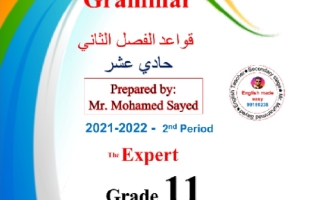مذكرة قواعد انجليزي حادي عشر ف2 #أ. محمد السيد 2021 2022
حروف الجر للزمان والمكان Prepositions of time and place
Use / Meaning
-The time preposition on is followed by a day or a date.
I'll see you on 21 July.
-The time preposition in is followed by a year or a time of day.
The author died in 1971.
-The time prepositions from ... to are followed by a day or a date.
The holiday lasted from Wednesday to Sunday.
- The place preposition in refers to something happening at a particular place.
I live in Kuwait City.
- The place preposition throughout refers to something happening all over a particular area.
Arabic is spoken throughout the Gulf.
- The place preposition to refers to something or someone moving towards a particular place.
I'm going to Dubai next week.
- Choose the correct preposition:
1-Sometimes, I visit my friends. ..................the evening.
a- in b -on C-at I d- by
2-Our summer holiday begins .................August.
a- in b -on C-at I d- by
3- Our first team will depart .........17th October to play against Saudi team.
a- in b -on C-at I d- by
4. It is hot ...............summer in Kuwait.
a- in b -on C-at I d- by
5- I usually get up ...................6:00 o'clock.
a- in b -on C-at I d- by
Collective nouns
Many collective nouns to refer to groups of people. Collective nouns are singular
However, they can take a singular or a plural verb
. Our team is playing really well at the moment. (team as one unit)
Our team are playing really well at the moment. (team as players)
(audience - class - crew - family - government - staff)
should I shouldn't have
A Form
should + the base form of the verb:
- You should always wear a seatbelt.
- You shouldn't use your mobile phone while driving.
should + have + past participle of the verb:
- The motorist should have driven more carefully.
B Use / Meaning
We use should for advice or recommendation: - You should wear a seatbelt. (I think it is important.) We use should have to criticise or give advice about something in the past:
- He should have driven more carefully. (But he didn't drive carefully.)
- You shouldn't have driven so fast. It was dangerous.
- You should have locked the door.
Stative vs. dynamic verbs أفعال الحركة والسكون
1 - Dynamic verbs: Verbs which refer to actions. We can use them in simple and continuous tenses:
a- I usually drink coffee every morning for breakfast.
b- This morning I am drinking tea.
2- Stative verbs: Verbs which refer to conditions or states. We do not usually use these verbs in continuous tenses. We use stative verbs to express what we think or believe and how we feel.
a- I believe traffic pollution is bad for us. (Not I am believing.........)
b-Do you know where she is? (Not Are you knowing.........)
This is a list of common stative verbs and example sentences:
Thinking verbs
know We don't know what to do.
realise Do you realise how disappointed I am?
suppose I suppose she's spent all her money.
understand I don't understand much about science.
agree I agree with you.
believe He believes everything he reads in the newspaper.
expect Do you expect to see him tomorrow?
suspect suspect she's caught my cold.
think Do you think things are getting worse?
reckon I reckon to leave at 3 o'clock.
- Choose the correct answer from a, b, c and d:
1-Faisal .........................that the world must do something to save Panda.
a- is believing b-was believing c- believes d- is being believed
2 I………………… -. this math lesson.
. a-don't understand b-doesn't understand c- not understanding d- not understanding
3-My sisters .………....... reading English novels
a-like b- likes C- are liking d- were liking
4-I……....breaking peoples' hearts.
b-hate
a-hates
c- is hating
d- was hating
5- She ........... about her exams now.
a-think
b-thinks
C- thinking
d-is thinking
6- We ...............at the moon then suddenly we saw some strange lights.
a- looking b-are looking C- were looking d-look
Do as required between brackets:
1- "Where will you spend your summer vacation?”
a- My cousin asked me where I spent my summer vacation.
b- My cousin asked me where I would spend my summer vacation.
C- My cousin asked me where I had spent my summer vacation,
2- "Are you doing research on Coronavirus?'
a- The journalist asked the experts if they had been doing research on Coronavirus.
b- The journalist asked the experts if they had done research on Coronavirus.
C- The journalist asked the experts if they were doing research on Coronavirus.
3-" Where did you go yesterday?"
a- My friend wanted to know where I go the day before.
b- My friend wanted to know where I would go the day before.
C- My friend wanted to know where I had gone the day before.
4- "We will test the new vaccine next month.'
a- They said they would test the new vaccine the following month.
b- They said they tested the new vaccine the following month.
C- They said they had tested the new vaccine the following month.
5- The doctor said to me, "Don't eat too much fast food.'
a- The doctor advised me don't eat too much fast food.
b- The doctor advised me not to eat too much fast food.
C- The doctor advised me not to don't eat too much fast food.
6- "I slept only for two hours last night.", He said.
He said. …………………………. (Complete)
a- he was sleeping only for two hours last night.
b- he had slept only for two hours the previous night.
C- he has slept only for two hours yesterday.

